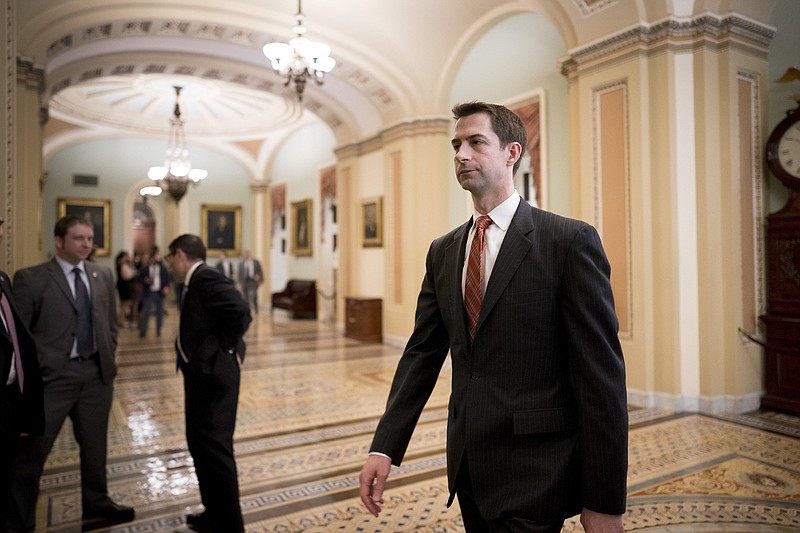China is imposing sanctions on U.S. Sen. Tom Cotton, R-Ark., and 10 other Americans, Chinese Foreign Ministry spokesman Zhao Lijian told reporters Monday.
The move was a reaction to sanctions imposed on 11 Chinese leaders Friday by the U.S. State and Treasury departments, he said.
It follows comments by Cotton comparing Communist China to Nazi Germany, imperial Japan and the Soviet Union.
Accusing the U.S. of interfering in China's internal affairs and violating "basic norms of international relations," Zhao said: "Intimidation will never work on the Chinese people."
At a news briefing, White House press secretary Kayleigh McEnany said the administration was "certainly aware" of the development, calling the unspecified sanctions "symbolic and ineffectual."
While declining to say whether the U.S. will respond, McEnany said, "This president has stood strongly against China, and he'll continue to do so."
Ka Zeng, director of Asian Studies and a political science professor at the University of Arkansas, Fayetteville, said tensions between the two countries are high.
"I think we're clearly at one of the lowest points in U.S.-China relations," she said.
Given Cotton's "more vocal stand against China on a number of issues ... it's not surprising that China would single him out," she said.
The senator, who once branded China "an enemy of the United States," has introduced at least 15 pieces of China-related legislation over the past three years, according to Congress.gov.
Mentioned as a possible 2024 presidential candidate, he is highly critical of China's treatment of pro-democracy protesters in Hong Kong and of ethnic and religious minorities.
In May, the lawmaker from Little Rock unveiled legislation making it easier for Americans to sue China for covid-19-related harm. In June, he introduced a bill that would prevent Chinese graduate students from studying science, technology, engineering and mathematics in the U.S.
Other Cotton legislation sought to prohibit the use of Chinese communications and technology equipment and to prevent extension of a nuclear arms control treaty unless China agrees to its terms.
Cotton, who serves on the Senate Armed Services Committee, has argued for additional defense spending, citing China's increased military might. He has also accused Beijing of stealing trade secrets and of flooding the U.S. with illicit fentanyl, contributing to an increase in fatal drug overdoses.
Last month, Cotton told a Senate banking committee subpanel that China is "the most formidable adversary the United States has faced in living memory."
"Near the height of its power in 1980, the Soviet Union's economy was 40 percent the size of the American economy. In 1943, the combined economies of our enemies, Nazi Germany and Imperial Japan, were also 40 percent the size of the American economy. Today, China's economy is two-thirds the size of our economy. So China is richer than any adversary we've faced," Cotton said.
Monday, Cotton portrayed Beijing's rebuke as a badge of honor.
"The Chinese Communist Party imposed these impotent sanctions against me because I defend the real victims of Chinese Communism: the millions of Americans harmed by the Wuhan coronavirus, the workers whose factories shut down and moved offshore to China, the businesses and inventors whose property has been stolen, the Chinese Christians and missionaries whose churches have been razed by bulldozers, the Uighurs and other minorities languishing in concentration camps, the Hong Kong students fighting desperately for their democracy, and the Chinese people trapped in a high-tech communist tyranny," he said in a written statement. "Chinese Communism is the most dangerous threat to freedom in the world, and I will never back down from fighting it. If China thinks my opposition to its communist tyranny to date warrants these sanctions, I have two words for them: just wait."
In addition to Cotton, five other Republican politicians face sanctions: U.S. Sens. Marco Rubio of Florida, Ted Cruz of Texas, Josh Hawley of Missouri and Pat Toomey of Pennsylvania, as well as U.S. Rep. Chris Smith of New Jersey.
All have been highly critical of the Chinese regime.
The others singled out by China were National Endowment for Democracy President Carl Gershman; National Democratic Institute President Derek Mitchell; International Republican Institute President Daniel Twining; Human Rights Watch Executive Director Kenneth Roth and Freedom House President Michael J. Abramowitz.
China's ability to punish the American leaders may be limited.
It could, for example, bar Cotton and the others from entry. Cotton has never visited Communist China and has no trips scheduled, a spokesman said.
It could also freeze Americans' assets; Cotton has none there, a spokesman said.
Zeng, the University of Arkansas professor, said tensions have increased due to the "emergence of a more nationalistic and assertive leadership" in China combined with "changes in the policy environment in the United States."
Robert Manning, a senior fellow at the nonpartisan Atlantic Council, expressed alarm at the increasingly hostile tone between the two nuclear powers.
"We're in ... what I would consider a free-fall, death spiral with China," Manning said. "Every time we do something, they feel compelled to respond."
Manning portrayed Chinese President Xi Jinping as the leader of a "techno-totalitarian revolution" who has been confrontational with his neighbors.
"He has been super aggressive all over the world in a very combative way, whether it's the Himalayas with India or the East China Sea with Japan [and] the South China Sea," he said.
With China-U.S. relations deteriorating, the risk of escalation is real, he said.
"I think we're in a dangerous game here," he said. "I think this whole cycle has created a situation where both sides see each other as existential threats."
"I'm afraid it will take a catastrophe, like the Cuban missile crisis did with Russia, before we begin to have a frame[work], an architecture of restraint and balance. Except next time, we might not be so lucky," he said.
